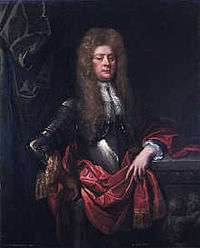John Dalrymple, 1st Earl of Stair

John Dalrymple (1648, Master of Stair – 8 January 1707) was a Scottish noble and Whig politician who played a crucial role in the 1707 Treaty of Union between the Kingdom of Scotland and the Kingdom of England, that created the Kingdom of Great Britain.
The son of James Dalrymple, 1st Viscount of Stair, John Dalrymple was born at Stair House in the parish of Stair, in Kyle, Ayrshire. He served under King James VII, but as a dominant force in the Scots Parliament he helped bring about the accession of William II (of Scotland) to the throne in 1688/9. In 1689 the king rewarded him with the position of Lord Advocate and in 1691 he was appointed Joint Secretary of State over Scotland with James Johnston.
Dalrymple is most remembered for his part in the 1692 Massacre of Glencoe. In 1695, the Scottish parliament demanded an enquiry into the massacre, and when the report from the enquiry was complete, they voted that "the killing of the Glencoe men was murder". Responsibility for the crime lay with the King's Scottish ministers, and many criticised William's shielding the Master of Stair, including Lord Macaulay, who termed it a "great breach of duty". The only punishment he endured was a dismissal from the Secretaryship of State. He returned to government in 1700 as a member of the Privy Council of Scotland. After succeeding his father as 2nd Viscount of Stair in 1695, he was created 1st Earl of Stair in 1703 by Queen Anne.
Family
He married Elizabeth Dundas (died 25 May 1731), daughter of Sir John Dundas of Newliston and Agnes Gray. They had 6 sons and 4 daughters, but only 3 sons and one daughter reached adulthood: John Dalrymple, 2nd Earl of Stair (born 1673, died 1747), William (baptised 11 October 1678, died 3 December 1744), Hon George Dalrymple of Dalmahoy (baptised 10 March 1680, died 29 July 1745) and Lady Margaret Dalrymple (baptised 25 August 1684, died 3 April 1779). After his death Elizabeth, Countess Dowager of Stair, acquired the house in Lady Gray's Close, Edinburgh, built and owned by her grandparents (Sir William and Lady Egidia Gray) and known as Lady Gray's House. They were renamed Lady Stair's Close and House respectively - now the Scottish Writer's Museum.
References
Sources
- http://www.cracroftspeerage.co.uk/online/content/Stair1703.htm
- http://www.scotlandsplaces.gov.uk/search_item/index.php?service=RCAHMS&id=111898
- http://www.capitalcollections.org.uk/index.php?a=ViewItem&i=12542
 "Dalrymple, John (1648-1707)". Dictionary of National Biography. London: Smith, Elder & Co. 1885–1900.
"Dalrymple, John (1648-1707)". Dictionary of National Biography. London: Smith, Elder & Co. 1885–1900.
| Legal offices | ||
|---|---|---|
| Preceded by George Mackenzie |
Lord Advocate 1687 – 1688 |
Succeeded by George Mackenzie |
| Preceded by Lord Colinton |
Lord Justice Clerk 1688 – 1690 |
Succeeded by Lord Cessnock |
| Preceded by George Mackenzie |
Lord Advocate 1689 – 1692 |
Succeeded by Sir James Stewart |
| Political offices | ||
| Preceded by Earl of Melville |
Secretary of State, Scotland 1691 – 1695 |
Succeeded by James Johnston |
| Parliament of Scotland | ||
| Preceded by Patrick Paterson |
Burgh Commissioner for Stranraer 1689 |
Succeeded by Sir Patrick Murray |
| Peerage of Scotland | ||
| New creation | Earl of Stair 1703 – 1707 |
Succeeded by John Dalrymple |
| Preceded by James Dalrymple |
Viscount of Stair 1695 – 1707 | |